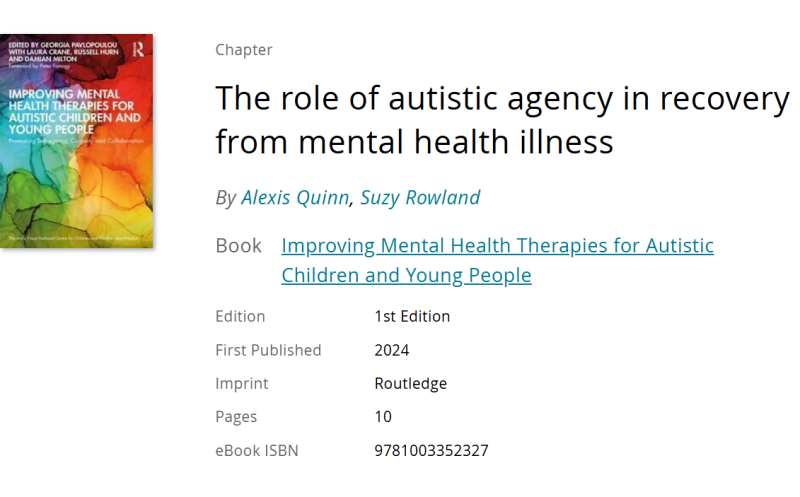by Alexis Quinn
A blog based on the research paper, “Relationships of concern - the perils of the progress paradox in Positive Behaviour Support” (Quinn, 2025)
Positive Behavioural Support (PBS) is widely promoted as an evidence-based framework designed to improve the quality of life for people with behaviours of concern. However, my personal experience (as recorded in my new journal article here) reveals a stark contrast between the model's intentions and its impact on my life. My experiences in 12 ‘care’ settings have shown that PBS can perpetuate harm in controlling and compliance dominant spaces, rather than healing. My paper suggests a shift toward a more compassionate, relational approach grounded in therapeutic love is needed.
The illusion of anything positive
Entering care settings by force, I found my hopes of support and understanding had already diminished when the door shut. PBS was integral to the disempowering, rights restricting spaces - a key mechanism of control, emphasising the identification of behaviours that needed to be modified rather than seeking to understand the needs and emotions underlying them. My sensory seeking, interests, and emotional expressions were frequently labelled as "challenging," reducing me to a set of symptoms to be managed. This objectification stripped away my identity, making me feel less like a human being with intrinsic value and more like a science experiment needing to be analysed.
PBS in practice, became synonymous with a loss of agency. I found myself confined to a system of metrics where my worth was contingent upon compliance with behavioural expectations. Instead of helping me to navigate my world, the emphasis on quantifying my outward expressions of distress created an oppressive atmosphere where I felt compelled to perform for the approval of staff. This constant monitoring resulted in shame and anxiety as I tried to suppress my authentic self in favour of a version that was deemed acceptable by others.
The pain of this experience was compounded by a relational dynamic steeped in power imbalances. Practitioners, armed with their scientific knowledge, objective assessments and all the force needed to make me do things I didn’t want to do, they often failed to recognize my subjectivity or acknowledge the emotional turmoil I was experiencing. Thus, I learned to mask my true self - a process that left me feeling disconnected, isolated, and increasingly vulnerable.
PBS enhanced a cycle of shame and meltdown
As time passed, the detrimental effects of PBS became evident in the emotional upheaval I experienced. I found myself caught in a cycle of shame and rage, plagued by the fear that I would never be accepted and was doomed. My emotional expressions, often dismissed as "behaviours that challenge," were rooted in my attempts to communicate my needs and experiences. Rather than receiving understanding, I was met with cold and clinical responses. The absence of reciprocity in my interactions with staff only deepened my sense of isolation and fear and I started to socially die.
Consequently, this environment led to increased distress and heightened episodes of meltdowns. I was trapped in an emotional sequence where my shame morphed into rage, only to be followed by guilt that spiralled me back into subservience. Each outburst became an opportunity for practitioners to reinforce negative perceptions, further eroding my self-acceptance in the process. Because humans are neurobiologically wired to connect, I had to find intimacy from somewhere. However, the only intimacy available was when staff were sharing their negative emotions with me e.g., their anxiety, fear and anger during restraint. I have called these relationships that developed, relationships of concern.
“Inherent in relationships of concern and cultivated in the petri dishes of behavioural science is one of the greatest disasters of behavioural intervention – the loss of trust in one’s own natural experiencing, desires, and imagination”

Figure from Quinn (2025) Aspects of the Self such as respect, trust, acceptance and love are diminished as they are not mirrored back to the person. Instead, staff and people come to relate through shared negative affect (in my case, hate), creating a relationship of concern.
Therapeutic Love: A New Approach to Support
In my paper I introduce the concept of therapeutic love which emphasises recognising people as whole beings, valuing their unique narratives, emotions, and experiences. It moves beyond what can be outwardly observed and focusses on what the person truly wants and needs. Quality of life should be defined not by adherence to behavioural norms, but by meaningful connections and genuine understanding. Support should not be about forcing compliance, but about fostering environments where people feel safe to express their true selves.
By prioritising loving relationships, staff can engage from a place of curiosity and compassion, where people can better co-create meaning and understanding, rather than relying solely on observation and measurement. This would reflect the complexity of human relationships and allow for deeper connections that honours personal histories and emotional needs.
This is not just a call for change; it is a commitment to therapeutic love, understanding, and the affirmation of every person’s right to exist authentically.
I am grateful to BILD for publishing this work and Darren Bowring for his support with the manuscript. It is important to have open, respectful discussions (especially where people have been harmed). The time has come to shift the conversation about behaviours, championing a framework that acknowledges ad responds to the inherent worth of every person.
See also from Alexis Quinn: New book chapter

Alexis Quinn has also two books
Autistic & Expecting - a practical guide for autistic parents to be and health care workers supporting them. Pavilion Press.
UNbroken - learning to live beyond diagnosis. Welbeck Publishing




Add comment
Comments